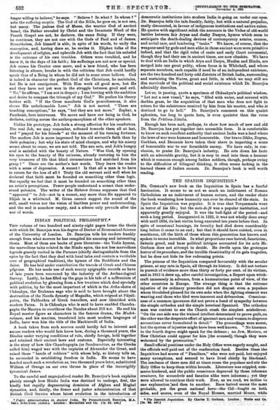INDIAN POLITICAL PHILOSOPHY.*
Tins volume of two hundred and ninety-eight pages forms the thesis with which Dr. Banerjea won hls degree of Doctor of Economical Science of the University of London. Dr. Banerjea tells his readers frankly enough from what sources he has compiled his amusing and interesting thesis. Most of them are books of pure literature—the Vedic hymns, the marvellous tales related In the Hindu epics, the not less marvellous legends gravely recited in the Puranas (chiefly distinguishable from the epics by the fact that they deal with local tales and contain a verifiable core of geographical tradition), the hymns, of the Buddhists and the Jains. He has laid wider contribution the travels of Greek and Chinese pilgrims. He has made use of such scanty epigraphic records as have of late years been recovered by the industry of the Archaeological Survey. Lastly, he has filled •up the gaps in his tale of a millennium of political evolution by gleaning from a few treatises which deal specially with politics, by far the most important of which is the Artha-ia stra of Chilnakya, the Brahman sage who is said to have brought about the destruction of the Nanda dynasty of Magadha, which reigned at Paten- putra, the Palibothra of Greek travellers, and now identified with modern Patna. It is ChAnakya who is said to have enabled Chandra- gupta the Maurya to overthrow the Nandas about 315 B.C. He and his Royal master figure as characters in the famous drama, the Muds& rakensa, and his maxims, translated into most modern languages of India, have won him the title of the Machiavelli of India.
A book taken from such sources could hardly fail to interest and amuse readers who would fain know how, during a thousand years, the Hindus wider varying conditions of rule, chiefly foreign, held together and retained their ancient laws and customs. Especially interesting is the story of how this Chandragupta (or Sandracottus, as the Greeks called him) waged war with the captains of Alexander the Great, and raised those " bands of robbers" with whose help, so history tells us, he succeeded in establishing freedom in India. He seems to have headed much such a revolution as, two thousand years later, substituted. William of Orange on our own throne in place of the incorrigibly tyrannical James.
To the careful and unprejudiced reader Dr. Banerjea's book explains plainly enough how Hindu India was destined to undergo, first, the kindly but rapidly degenerating dominion of Afghan and Moghal dynasties, and, finally, the firmer and juster administration of that British Civil Service whose latest evolution in the introduction of
- • ?Win Administration in Ancient India. By Pramathanath Banerjea, Die.Econ. (Lend.). Loudon: Maendllan sad Co. 17a. dd. net.)
democratic institutions into modern India is going on under our eyes. Dr. Banerjea tells the tale frankly, fairly, but with a natural prejudice, easily discounted, in favour of indigenous institutions and native rulers. He quotes with significant relish the accounts in the Vedas of old-world battles between fair Aryas and dusky Dasyus, hymns which seem to anticipate the death-dealing devices of contemporary armies, cannon, and aerial care, and lumbering " tanks." We know, of course, that the weapons used by gods and men alike in those ancient wars were primitive indeed, and that the rigid rules of caste and early Court ceremonial, though they had their use in ancient times, are now obsolete. We have to deal with an India in which Arya and Dasyu, Muslim and Hindu, are merged into one great polity, whose focus is in Whitehall, and whose separate members, each capable if need be of an independent existence, are the two hundred and forty odd districts of British India, surrounding and sustaining the States, great and little, in which we may still see dim survivals of the political and social existence which Dr. Banerjea admirably describes.
Let us, in passing, quote a specimen of ChAnakya's political wisdom. " Let not a new vessel," he says, " filled with water, and covered with darbha grass, be the acquisition of that man who does not fight in return for the subsistence received by him from his master, and who is destined to go to hell." Dr. Banerjea's comment on this quaint aphorism, too long to quote here, is even quainter than the verse from the Priltima-Ndtalsi.
Enough has been said, perhaps, to show how much of new and old Dr. Banerjea has put together into accessible form. It is comfortable to know on such excellent authority that ancient India was a land where the laws of war were humane and honourable. Our brave Sikhs, Dogras, Gurkhas, and Deccanis have taken their share in imparting a sense of honourable war to our formidable enemy. We have only, in con- clusion, to prairie Dr. Banerjea's industry. He sets down his facts with an admirable gravity, but it is easy to read into them a humour which is common enough among Indian soldiers, though, perhaps owing to the difficulties of bilingual thinking, it often seems lacking in the learned theses of Indian savants. Dr. Banerjea's book is well worth reading.














































 Previous page
Previous page